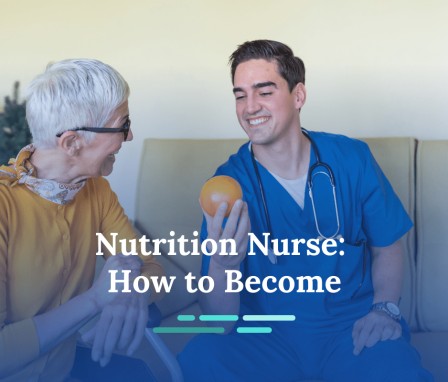How to Become a Nutrition Nurse
 If you’re interested in becoming a nutrition nurse, you’ve come to the right place.
If you’re interested in becoming a nutrition nurse, you’ve come to the right place.
Nursing offers a wide range of specializations, and nutrition nursing is a valuable one.
Nutrition nurses are skilled communicators with strong interpersonal abilities, and they play an important role in supporting patients’ nutritional needs.
This specialization can be highly rewarding as nutrition nurses are a significant asset to both the medical field and the people they serve.
In this guide, we’ll dive into the steps to become a nutrition nurse, the education and nutrition nurse certification you’ll need, and the opportunities and challenges of this nursing career.

Struggling to meet your deadline?
Get your assignment on How to Become a Nutrition Nurse done by certified MDs and PhDs in the USA. ORDER NOW!
What Does a Nutrition Nurse Do?
A nutrition nurse specializes in providing essential nutritional care in nursing to individuals dealing with specific medical conditions, such as diabetes, heart disease, cancer, or malnutrition.
Nutrition nurses often work with patients in hospitals, long-term care settings, wellness programs, and outpatient clinics, where they focus on promoting health through proper nutrition. Some areas of specialized nutrition nursing include geriatrics, clinical nutrition support, and nutritional counseling for nurses.
Key Responsibilities and Duties
Nutrition nurses have a variety of responsibilities, including:
- Assessing patients’ nutritional needs
- Creating tailored nutritional care plans
- Educating patients and families about proper nutrition
- Collaborating with physicians and dietitians to manage dietary treatments
- Monitoring patients’ progress and adjusting plans as necessary
They work in various environments such as long-term care facilities, schools, outpatient clinics, and community health programs.
Specialized Areas Within Nutrition Nursing
There are different types of nutrition nursing, including:
- Geriatric nutrition nurse: Focused on the elderly, often in long-term care or nursing home settings.
- Clinical nutrition nurse: Works in hospitals, providing nutrition support for critically ill patients.
- Nutrition support nurse: Specializes in enteral or parenteral nutrition, providing patients with nutrients directly into the digestive system.
- Nutritional counseling for nurses: Helping other nurses and healthcare providers understand the role of nutrition in health management.
How Long Does It Take to Become a Nutrition Nurse?
Becoming a nutrition nurse typically takes between 3 to 5 years. This includes earning the required degree and completing nutrition nurse certification. If you choose to pursue a nurse practitioner role, which may involve more advanced responsibilities in nutrition care, this could take additional time.
Timeline for Education and Certification
- 3-5 years depending on your degree path.
- Degree required: Associate Degree in Nursing (ADN) or Bachelor of Science in Nursing (BSN).
- The nutrition nurse certification exam takes place after completing the necessary education.
Job Outlook
The job growth for nutrition nurses is expected to grow by 7% from 2019-2029, which is a good indication of increasing opportunities in this field (Source: BLS).
How to Become a Nutrition Nurse: Step-by-Step Guide
Key Steps in Becoming a Nutrition Nurse
- Earn a BSN Degree:
A BSN is typically the required degree to pursue a career in nutrition nursing. This is a four-year degree, although an ADN (Associate Degree in Nursing) can also be an option if followed by an RN-to-BSN program. - Pass the NCLEX Exam:
Once you’ve completed your nursing degree, you must pass the National Council Licensure Examination (NCLEX) to become a licensed registered nurse (RN). - Earn Certification in Nutrition:
After obtaining your RN license, you can pursue nutrition nurse certification through organizations like the National Board of Nutrition Support Certification (NBNSC) or the American Association of Nutritional Consultants (AANC). Certification is not mandatory but can significantly enhance your career opportunities and demonstrate your expertise in nutrition nursing. - Find Employment:
After earning your nutrition nurse certification, you can begin your job search. Nutrition nurses are in demand in hospitals, long-term care facilities, and wellness programs.
Essential Educational Pathways
While you can start with an ADN, many nutrition nurses pursue a BSN, as it opens more career doors and is required for advanced certifications. Online programs for nutrition nursing programs are available for those who prefer flexible study options.
Education Requirements to Become a Nutrition Nurse
RN Licensure and Degree Options (ADN vs. BSN)
To become a nutrition nurse, you must first obtain your RN license by completing an accredited nursing program, either an ADN or BSN. The BSN offers more comprehensive training, and nurses with a BSN typically have a wider range of job opportunities.
Nursing Specializations for Nutrition
Once you become an RN, you can pursue nursing specialties in nutrition, such as clinical nutrition nursing, geriatrics, or nutrition support nursing.
Certification for Nutrition Nurses
Nutrition nurse certification demonstrates your knowledge and skills in this area. Although certification isn’t required to practice as an RN or a nutrition nurse, it’s highly valued by employers and shows expertise in your field. Two main certification organizations are:
- NBNSC: National Board of Nutrition Support Certification
- AANC: American Association of Nutritional Consultants
Maintaining certification involves retaking exams every 5 years, and staying current with the latest in nutritional education for nurses.
Nutrition Nurse Salary and Job Outlook
The average annual nutrition nurse salary in the U.S. is approximately $64,040, but this can vary depending on experience, location, and the setting in which you work. With nutrition nurse job growth expected to increase by 7% from 2019-2029, there are strong employment opportunities. Factors such as geographic location, years of experience, and level of education can all influence salary.
Job Growth and Employment Opportunities
As the population ages and healthcare systems become more focused on preventative care and disease management, nutrition nurse career opportunities are expanding in hospitals, nursing homes, wellness programs, and private practices.
Factors Influencing Salary and Employment
The nutrition nurse salary can vary by:
- Location: Nurses in urban areas tend to earn more.
- Experience: More experienced nurses may earn higher wages.
- Education: A BSN or additional certifications can lead to higher-paying opportunities.
Skills Needed to Become a Successful Nutrition Nurse
In addition to clinical expertise in nutrition, successful nutrition nurses need the following key skills:
- Interpersonal skills: Nutrition nurses often work closely with patients, families, and healthcare teams.
- Clinical knowledge: Understanding of how nutrition impacts health and healing.
- Communication skills: Clear communication is essential for teaching patients and working with healthcare teams.
- Time management: Ability to manage multiple patients and tasks efficiently.
Common Nutritional Deficiencies in Nursing Students
Nutritional deficiencies in nursing students are common and can impact performance. Aspiring nurses may struggle with maintaining a balanced diet while managing demanding coursework. To address these issues, nursing programs often incorporate nutritional education for nurses to help students better understand their own nutritional needs and improve their academic performance.
Nutrition Nurse Specializations and Career Options
There are several specializations in nutrition nursing, including:
- Geriatric nutrition nurse: Working with elderly patients to manage nutrition in long-term care or nursing home settings.
- Clinical nutrition support nurse: Specializing in the nutritional needs of hospitalized patients.
- Wellness programs: In community health settings, nutrition nurses develop programs to improve overall wellness and prevent chronic diseases.
 Licensure and Continuing Education for Nutrition Nurses
Licensure and Continuing Education for Nutrition Nurses
Once licensed as an RN, nutrition nurses must maintain continuing education to stay current in the field. Some states require continuing education hours for license renewal, and certain certifications may also require periodic renewal.
Working as a Nutrition Nurse
Nutrition nurses can work in various settings, including hospitals, long-term care facilities, outpatient clinics, and wellness programs. As a nutrition nurse, you might find yourself working in community health, geriatrics, wellness programs, or clinical nutrition support settings.
Nutrition Nurse Job Description
A nutrition nurse job description typically includes assessing patient needs, developing nutrition care plans, and providing counseling. Nurses may also collaborate with other healthcare professionals to ensure that patients’ nutritional needs are met.
FAQs About Becoming a Nutrition Nurse
1. How long does it take to become a nutrition nurse?
It typically takes 3-5 years to become a nutrition nurse, depending on your educational path.
2. What’s the quickest path to becoming a nutrition nurse?
Completing an ADN and obtaining nutrition nurse certification online can shorten the path to becoming a nutrition nurse.
3. Is nutrition nursing a competitive career?
With increasing awareness of the importance of nutrition in health, nutrition nursing is a growing field, and there are many career opportunities.
4. How much do nutrition nurses earn?
The average salary for a nutrition nurse is about $64,040, but salaries can range between $39,000 and $81,500, depending on experience and location.
Becoming a nutrition nurse is a fulfilling career choice, offering strong job opportunities and the chance to make a positive impact on patients’ health. With the right educational path and nutrition nurse certification, you can thrive in this growing field.

Dont wait until the last minute.
Provide your requirements and let our native nursing writers deliver your assignments ASAP.

